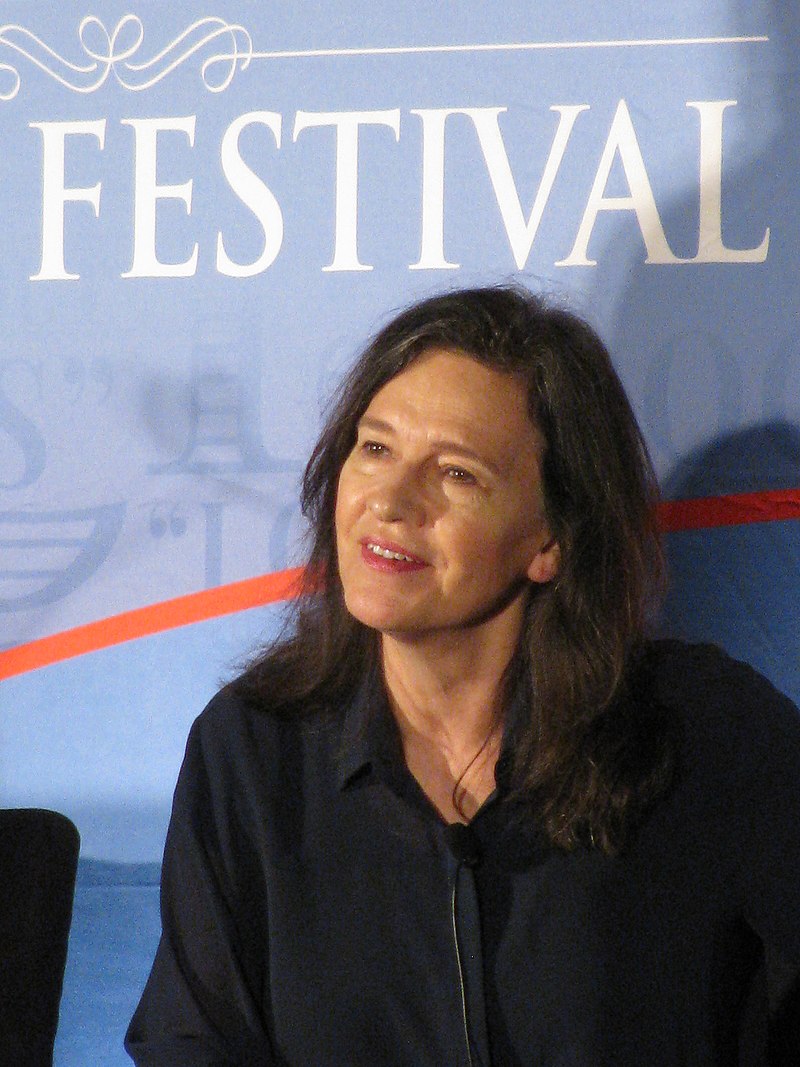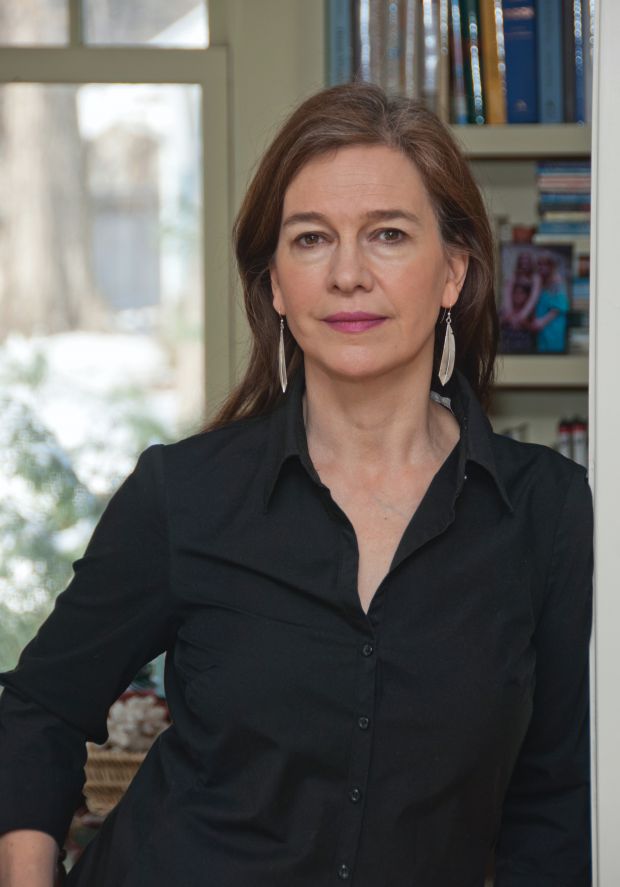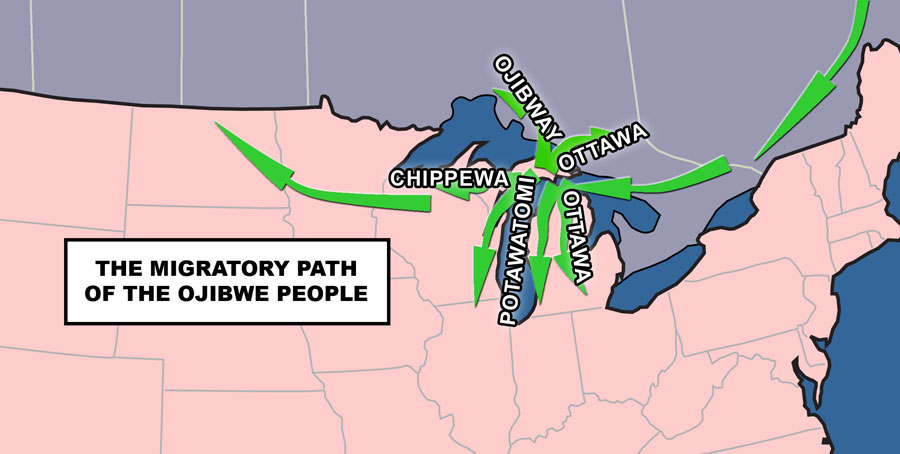 |
Craig White's Literature Courses Critical Sources
notes for
The Round House
2012 novel by Louise Erdrich |
 |
|
Louise Erdrich (b. 1954), a member of the Turtle Mountain Band of Chippewa Indians, is the author of fourteen novels, poetry, children's literature, and essays.
Erdrich's first novel, Love Medicine (1984, 1993, 2009), won the 1984 National Book Critics Circle Award and began a series of novels featuring characters related through its setting, a North Dakota Indian reservation.
Her 2009 novel, A Plague of Doves, was nominated for that year's Pulitzer Prize in Fiction. The Round House, a part-sequel to Plague of Doves, won the National Book Award for Fiction in 2012.
Erdrich and her sister own Birchbark Books, an independent bookstore in Minneapolis that also serves as a community center for the city's Indian community. |
|
Characters in The Round House (roughly in order of appearance or mention; central characters' names in large font; continuing characters in bold)
![]() Mooshun: "grandfather" in
Chippewa language:
Mide priest; maternal grandfather to narrator Joe; father to Geraldine,
Clemence, & Whitey; son of Joseph & Lulu (who appear in earlier Erdrich novels);
married & widowed to Junesse. Mooshun's "sleeptalking" about Akiikwe
("Earth Woman") and her son provides a legendary background for Joe to
understand his mission of protecting his mother by killing the
wiindigoo or evil spirit
threatening her
Mooshun: "grandfather" in
Chippewa language:
Mide priest; maternal grandfather to narrator Joe; father to Geraldine,
Clemence, & Whitey; son of Joseph & Lulu (who appear in earlier Erdrich novels);
married & widowed to Junesse. Mooshun's "sleeptalking" about Akiikwe
("Earth Woman") and her son provides a legendary background for Joe to
understand his mission of protecting his mother by killing the
wiindigoo or evil spirit
threatening her
![]() "Joe":
Antone Bazil Coutts the 2nd; 13-year-old narrator / protagonist of The Round
House; self-renamed after great-grandfather Joseph.
"Joe":
Antone Bazil Coutts the 2nd; 13-year-old narrator / protagonist of The Round
House; self-renamed after great-grandfather Joseph.
![]() Judge Antone Bazil Coutts, "Dad":
Joe's father, tribal judge on reservation. (Judge Coutts is a leading
character in Erdrich's previous novel, A Plague of Doves, 2009).
Judge Antone Bazil Coutts, "Dad":
Joe's father, tribal judge on reservation. (Judge Coutts is a leading
character in Erdrich's previous novel, A Plague of Doves, 2009).
![]() Geraldine Coutts, "Mom":
Joe's mother, Bazil's wife, Mooshun's daughter; victim of rape at Round House,
the action that starts the novel's plot.
Geraldine Coutts, "Mom":
Joe's mother, Bazil's wife, Mooshun's daughter; victim of rape at Round House,
the action that starts the novel's plot.
![]() Clemence Milk:
Geraldine's sister; Joe's aunt; married to
Edward Milk.
Clemence Milk:
Geraldine's sister; Joe's aunt; married to
Edward Milk.
![]() Vince Madwesin: tribal policeman; stepfather to Joe's friend
Zack Peace
Vince Madwesin: tribal policeman; stepfather to Joe's friend
Zack Peace
![]() Dr. Egge: white medical doctor who treats Geraldine after her assault. His
description conforms to minority
literature's frequent representation of
dominant-culture characters as
grotesque, cold, and inhuman.
Dr. Egge: white medical doctor who treats Geraldine after her assault. His
description conforms to minority
literature's frequent representation of
dominant-culture characters as
grotesque, cold, and inhuman.
![]() Whitey, "Uncle Whitey":
Joe's maternal uncle, married to Sonja; owns and manages Mighty Al's, a
reservation convenience store / grocery,
Whitey, "Uncle Whitey":
Joe's maternal uncle, married to Sonja; owns and manages Mighty Al's, a
reservation convenience store / grocery,
![]() Sonja, wife to
Whitey; former stripper, co-manageer of reservation convenience store / grocery;
Joe's aunt by marriage and forbidden love-interest
Sonja, wife to
Whitey; former stripper, co-manageer of reservation convenience store / grocery;
Joe's aunt by marriage and forbidden love-interest
Joe's friends:
![]() "Cappy": Virgil
Lafournais: Joe's best friend; boyfriend to Zelia from Montana;
Cappy's family:
"Cappy": Virgil
Lafournais: Joe's best friend; boyfriend to Zelia from Montana;
Cappy's family:
![]() Doe Lafournais, Cappy's father, announcer at Powwow, owner of
rifles
Doe Lafournais, Cappy's father, announcer at Powwow, owner of
rifles
![]() Randall Lafournais,Cappy's older brother, powwow dancer and
student-priest in Mediwiwin Medicine Society
Randall Lafournais,Cappy's older brother, powwow dancer and
student-priest in Mediwiwin Medicine Society
![]() Suzette & Josey, Cappy's aunts; unmarried
sisters, powwow dancers
Suzette & Josey, Cappy's aunts; unmarried
sisters, powwow dancers
![]() Zack Peace, stepson to tribal policeman Vince Madwesin; related
to Corwin and Carleen Thunder; grandson to Ignatia Thunder, who
feeds Joe and friends in her apartment while she and her friend Mrs. Bijiu
discuss past and potential sex partners.
Zack Peace, stepson to tribal policeman Vince Madwesin; related
to Corwin and Carleen Thunder; grandson to Ignatia Thunder, who
feeds Joe and friends in her apartment while she and her friend Mrs. Bijiu
discuss past and potential sex partners.
![]() Angus Kershaw a.k.a. "Starboy": lives with Aunt Star
and her partner Elwin
Angus Kershaw a.k.a. "Starboy": lives with Aunt Star
and her partner Elwin
![]() Pearl, dog brought to Coutts's home to protect Geraldine during
her recovery.
Pearl, dog brought to Coutts's home to protect Geraldine during
her recovery.
![]() Chilboy Snow
Chilboy Snow
![]() Gabir Olson, a judge or legal expert in Bismarck, the North
Dakota capital, with whom Joe's father, Judge Coutts, consults
Gabir Olson, a judge or legal expert in Bismarck, the North
Dakota capital, with whom Joe's father, Judge Coutts, consults
![]() Opichi Wold
Opichi Wold
![]() Ghost at edge of Coutts's yard (pp. 79-80)
Ghost at edge of Coutts's yard (pp. 79-80)
The Lark & Wishkob families
![]() George and Grace Lark, white owners of Vinland Supermart, which
closes after Indians boycott it in favor of Mighty Al's; parents of fraternal
twins, son Linden and daughter Linda.
George and Grace Lark, white owners of Vinland Supermart, which
closes after Indians boycott it in favor of Mighty Al's; parents of fraternal
twins, son Linden and daughter Linda.
![]() Linden Lark,
first-born twin; resentful of loss of Vinland Supermart; possibly possessed by a
Wiindigoo; jealous of twin sister
Linda's happy adoptive Indian family life;
Linden Lark,
first-born twin; resentful of loss of Vinland Supermart; possibly possessed by a
Wiindigoo; jealous of twin sister
Linda's happy adoptive Indian family life;
![]() Linda Lark Wishkob,
second-born twin, abandoned by Lark family on account of birth defects, adopted
by Indian nurse Betty Wishkob; family nickname: "Tuffy"; works at reservation post office; pressured by her biological
mother, Linda donates a kidney to her brother Linden.
Linda Lark Wishkob,
second-born twin, abandoned by Lark family on account of birth defects, adopted
by Indian nurse Betty Wishkob; family nickname: "Tuffy"; works at reservation post office; pressured by her biological
mother, Linda donates a kidney to her brother Linden.
![]() In chapter 6, Linda describes her twin Linden as her
doppelganger, a ghostly double
or spiritual presence who alternately sympathizes with or bedevils her. Recall
twins in American Indian
Origin Stories.
In chapter 6, Linda describes her twin Linden as her
doppelganger, a ghostly double
or spiritual presence who alternately sympathizes with or bedevils her. Recall
twins in American Indian
Origin Stories.
![]() Horace Whiteboy
Horace Whiteboy
![]() LaRose, Geraldine's school friend
LaRose, Geraldine's school friend
![]() Father Travis Wozniak:
Catholic priest, former U.S. Marine injured in
1983
U.S. Embassy bombing
during Lebanese Civil War
Father Travis Wozniak:
Catholic priest, former U.S. Marine injured in
1983
U.S. Embassy bombing
during Lebanese Civil War
![]() Mrs. Bineshi, keeper of many reservation dogs
Mrs. Bineshi, keeper of many reservation dogs
![]() Soren Bjerke, FBI agent, friend of Judge Coutts
Soren Bjerke, FBI agent, friend of Judge Coutts
![]() Cedric and Cheryl
Cedric and Cheryl
![]() Bugger Poirier, homeless drunk who steals Joe's bicycle and
later tells him a dream that helps solve a mystery.
Bugger Poirier, homeless drunk who steals Joe's bicycle and
later tells him a dream that helps solve a mystery.
![]() Curtis W. Yeltow: (fictional) governor of South Dakota; fathers
a child with Mayla Wolfskin and later tries to adopt the child.
Curtis W. Yeltow: (fictional) governor of South Dakota; fathers
a child with Mayla Wolfskin and later tries to adopt the child.
![]() Mayla Wolfskin, daughter of George & Aurora Wolfskin
(grand-daughter of Crow Creek?); Mayla is at the Round House with her infant
daughter when Geraldine is raped there; Mayla disappears and is presumed murdered
by the rapist.
Mayla Wolfskin, daughter of George & Aurora Wolfskin
(grand-daughter of Crow Creek?); Mayla is at the Round House with her infant
daughter when Geraldine is raped there; Mayla disappears and is presumed murdered
by the rapist.
![]() Akiikwe ("Earth Woman"), a.k.a.
Akii:
a legendary woman possessed by a Windigoo or
Wendigo as told in Mooshin's
"sleeptalking" stories to Joe; Akiikwe's husband is Mirage.
Akiikwe ("Earth Woman"), a.k.a.
Akii:
a legendary woman possessed by a Windigoo or
Wendigo as told in Mooshin's
"sleeptalking" stories to Joe; Akiikwe's husband is Mirage.
![]() Neal, young white epileptic man associated with "Youth Encounter Christ—YEC." As
with Dr. Egge, Neal's description conforms to
minority literature's frequent
representation of dominant-culture
characters as grotesque, weird, or
pathetic.
Neal, young white epileptic man associated with "Youth Encounter Christ—YEC." As
with Dr. Egge, Neal's description conforms to
minority literature's frequent
representation of dominant-culture
characters as grotesque, weird, or
pathetic.
![]() Zelia a.k.a. Dream Girl, Mexican-American girl from Montana
associated with Youth Encounter Christ. Her relationship with Cappy angers
Father Travis and leads her parents to forbid further contact.
Zelia a.k.a. Dream Girl, Mexican-American girl from Montana
associated with Youth Encounter Christ. Her relationship with Cappy angers
Father Travis and leads her parents to forbid further contact.
![]() Ruby Smoke
Ruby Smoke
![]() Liver Eating Johnson
Liver Eating Johnson
![]() Snow Goodchild (waitress at Might Al's?)
Snow Goodchild (waitress at Might Al's?)
Places / settings in The Round House
|
Time: 1988. The Round House takes place at an unnamed Chippewa reservation in North Dakota.
the round house: a community structure built for traditional Indian spiritual ceremonies. (Potential symbol: Earth itself = the round house? Akikwe / Akii is "Earth Woman.")
Vinland Supermart, owned by George and Grace Lark, a white family, before going out of business due to Indian-owned competition. (Potential symbol: Vinland = name for North American coastal area given by Norse Viking explorers and part-settlers beginning in 1000AD, five centuries before Columbus.)
Whitey's Place: convenience store / grocery owned and managed by Joe's Uncle Whitey & Aunt Sonja; Joe works there for part of the summer
Hoopdance, nearby town
Dead Custer Bar (named for Custer's Last Stand at the Battle of Little Big Horn during the Indian Wars.
Mighty Al's, a small restaurant.
Vert's Supper Club: restaurant where Grace Lark meets Linda Lark Wishkob to ask her to donate a kidney for her twin Linden.
Puffy's Place: Indian-owned, Indian-employed grocery store |
|
definitions / terms in The Round House
Algonquian: A major language group of North American Indians including the Anishinabe / Chippewa / Ojibwe represented in The Round House.
Sweat lodge: a hut prepared for ceremonies of purification and healing. Water is poured over hot stones to create steam; the resulting sweat purifies the participants. Originally sweat lodges were a feature of Plains Indian culture (e.g., the Sioux peoples), but as with powwows, sweat lodges have become popular pan-Indian ceremonies and have also been appropriated (sometimes improperly) by New Age religious practitioners.
Mide, Midewiwin: Grand Medicine Society of some North American Indian nations.
Metis, mixed-race culture descended from Native Americans (mostly women) and Europeans (mostly French and Scots-Candadian fur traders). (See Louis Riel below.)
Michif: language (+ culture?) of Metis people combining Cree and Metis French (variety of Canadian French) + borrowings from Ojibwe and other Indian languages.
Cree: a major First Nation of North America; Algonquian language group; active in North American fur trade; now concentrated in Montana.
Louis Riel (1844-1885) (mentioned in ch. 5): Canadian politician, leader of Metis people in rebellion against Canadian government. (The Metis people developed their own distinct Indian culture as mixed-race descendants of Native Americans and European settlers.)
Wiindigoo, Wendigo, Windigo: a mythical cannibal monster or evil spirit in Algonquian folklore.
Shananobinesi: Southern Thunderbird, south wind
doodem: Anishinabe word for "clan." The word was adapted into English as "totem" for the symbol or guardian animal of a clan. In The Round House, Joe's mother is from the Turtle Clan, his father from the Crane Clan. Since Anishinabe clans are patrilineal, Joe's protector animal is a crane or another water bird, in one case a heron.
doodemag: luck?
Haskell: Haskell Institute, now Haskell Indian Nations University in Lawrence, Kansas; founded 1884 as an industrial training school for American Indians, which in the 20th century transitioned to become a high school, then a junior college, now a university.
Frybread: a semi-traditional pan-Indian food originally developed from flour provided by U.S. government to support Indian peoples. (Wheat is not native to the New World / Americas.)
Swamp tea: Native American tea made from leaves of Labrador plant growing in swampy areas. See T Ching on Swamp Tea.
Kinnikinnick: herbal smoking mixture
BIA or Bureau of Indian Affairs, U.S. federal government agency, established 1824.
Bench notes (ch. 6): "A laboratory analyst's recorded notes" (Termwiki) but "bench" can also refer to a judgeship and thus to Judge Coutts's notes on a case.
doppelganger (ch.6): see note above under Characters: Linda Lark Wishkob
gundog (ch. 8): a hunting dog
LitCharts: Round House study guide



